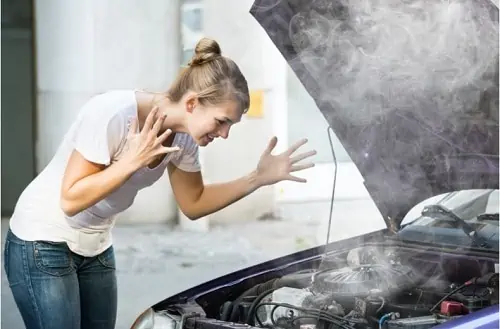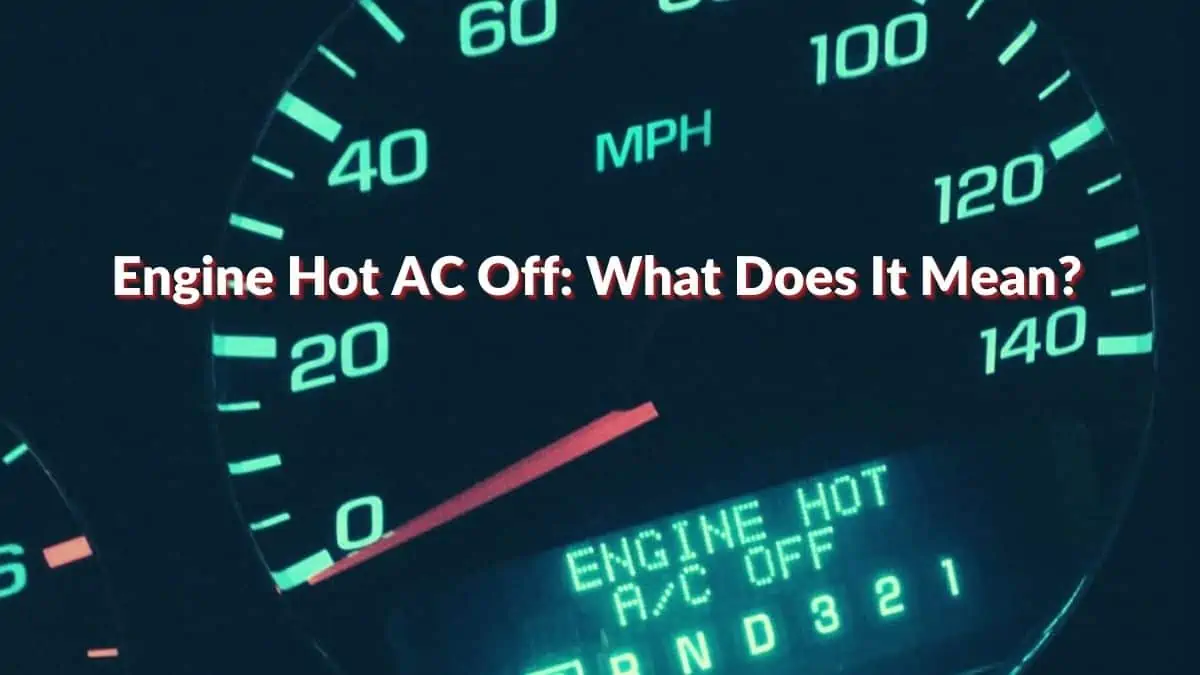Almost every driver knows how critical an engine is. Therefore, an Engine Hot AC Off warning may trigger feelings of worry and confusion for a driver.
While an Engine Hot AC Off warning could spell a lot of trouble for your car, it is not uncommon.
Your vehicle may display the message “AC Off Due to High Engine Temp.” So, what is an Engine Hot AC Off warning? What triggers it?
How can it be resolved? Are there chances that the car may explode or break down if your engine continues running? And how do you prevent your car engine from overheating?
What Does Engine Hot AC Off mean?
The Engine Hot AC Off warning light indicates that the car’s electric cooling fan is malfunctioning, and as a result, the engine is running hot or overheating.
Notably, overheating is the top cause of engine deaths globally. Thus, you should take immediate action when your engine overheats.
The AC consumes a lot of energy that the engine may not be able to generate, alongside running properly during a fan failure. Consequently, your AC may go off due to high engine temperatures to reduce the load on the engine.
A cooling system leak, low engine coolant levels, a broken water pump, or faulty wiring of the car’s components could trigger the Engine Hot AC Off warning.
Can You Still Drive When Engine Hot AC Off Error Message Is Showing?

Stop immediately to assess the situation of your engine. Your engine makes your car go and can cost a fortune to fix or replace. You should, for no reason, continue straining your car’s engine by driving, especially an overheating one.
Safe Handling Of A Running Overheating Engine

If your car overheats when the AC is on while driving:
Turn Up The Heat
While turning up the heat might seem illogical, it can help ease the stress on the engine for a while. This helps pull up some of the heat from your engine bay to the cabin, thus cooling down the engine and allowing you to drive for a short distance.
On the other hand, the air conditioner should be off as it could worsen the problem.
Slowly And Carefully Pull Over
If you are on a busy stretch of road or caught in a traffic jam, use your hazard lights to alert other motorists of your intentions to slow down and pull over to the side.
Turn Off The Engine
To help control the heat, you need to power down its source and turn off the engine.
Keep The Hood Closed For Some Time
Only remotely pop the hood and wait for at least 15 minutes before opening it. Many drivers rush to open the hood to let the hot air out. While this may help bring in more air, it can cause severe burns to your face. In addition to the steam, the hot metal can cause harm to your hands.
Check The Engine Coolant Level
If the coolant level is low, top up the reservoir. Consult the vehicle manual to know the suitable coolant to use as different engines have different types of coolant.
Seek Professional Help
You can reach out to a professional mechanic for help or call a tow truck company to help you move your car to the nearest garage.
What Causes Engine Overheating Problems?
Low Coolant Levels
For many reasons, running low on coolant is the most common cause of engine overheating. If the coolant levels are low, you will need to add a coolant to the coolant reservoir. Inspect the radiator and hose for leaks before refilling the coolant.
Blown Up Head Gasket
A head gasket is a seal between the cylinder head and engine block. It keeps combustion gasses in the cylinders and prevents the coolant or engine oil from going into the cylinders.
Head gasket issues are hard to diagnose as they are only visible when you take the engine apart. You should know the secondary symptoms to determine whether the head gasket is blown. These include white exhaust smoke, engine overheating, low coolant levels, and a strong sweet smell of heated coolant.
Malfunctioning Temperature Sensor
The temperature gauge is essential as it shows when your engine starts to overheat. The temp gauge receives its instructions from the temperature sensor. So if the temperature sensor breaks down, you may not receive the correct report, and excessive heat could damage your engine permanently.
Problems With The Radiator Cooling Fan
If the radiator fan does not come on, your engine may overheat and burn out.
AC Compressor Issues
The AC compressor takes care of the car’s air conditioning unit. When it fails, the engine may overheat. Only a professional mechanic should attempt to fix an AC compressor.
Some signs that the AC compressor is faulty include temperature fluctuations and squealing noises.
Fixing Overheating Problems Yourself
It is possible to fix some overheating problems with some DIY knowledge.
You would first inspect the cooling system. If you know where to find the radiator and radiator hose, you could check if there is a leak. Wait at least 30 minutes after turning off the engine to let the system cool down before fixing a radiator leak.
If it is a leak, adjust the hose to fit correctly, then tighten the radiator clamps. And if it’s a hole in the radiator hose, you could patch it with insulating tape as you carefully drive to the nearest garage.
How To Prevent Engine Overheating Problems
Schedule Regular Maintenance Services
Cars need regular maintenance to keep running their best. Standard maintenance involves checking the tires, replacing the air filters, and changing the engine oil.
Like any other fluid, the quality of your coolant deteriorates with time, and you need to replace it. Accordingly, conducting coolant flushes and changes is essential for the health of your engine.
Inspecting your radiator cap is also good maintenance practice. The radiator is responsible for maintaining pressure within your cooling system. A loose cap results in minor leaks that decrease the system’s pressure. This could eventually lead to overheating of the engine.
Pay Attention To The Temperature Gauge
The car’s temperature gauge enables you to read and understand the temperature conditions within your engine. Constantly check your gauge to ensure that your engine’s temperatures are well within the safe zone. If they keep rising, contact a professional mechanic.
Do Not Leave Your Car In The Sun For Extended Periods
You probably understand the impact of the sun’s heat in an enclosed space if you’ve ever sat inside a car during a hot summer day. The effect of hot weather on an engine may trigger overheating.
Drive With Extra Coolant
Keeping extra coolant in your car is always a good idea. If you have an emergency, you can refill your reservoir.
Use A Diagnostic Scan Tool To Determine Temperature Sensor Issues
The scan tool connects under the dashboard of your car. It can give you information about your engine temperatures. If the scanner pops a code, you can know whether your temperature sensor is functioning correctly.
Conclusion
An Engine Hot AC Off warning could be just the beginning of a severe problem. That is why you should not take it lightly.
If you encounter an Engine Hot AC Off warning in your car, pull over safely.
See a professional to diagnose the problem and repair any damage. Prevent it from happening again with regular maintenance. And always drive safely!

Garry is the happy owner of a funky 2018 Nissan Juke Ti-S AWD. After growing up around his family’s mechanics shop, he is passionate about bringing budget-friendly car care to every driver. Garry has a business degree and is a car enthusiast.

